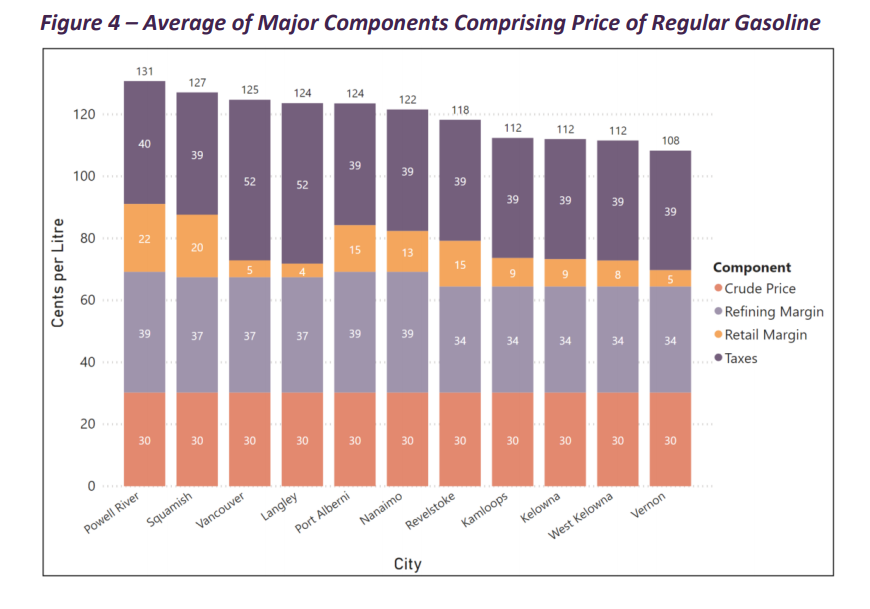Why does gas cost more in Squamish than Metro Vancouver, when the community pays lower fuel taxes that the Lower Mainland?

It’s one of the questions raised by the latest report from the B.C. Utilities Commission into how fuel is priced in British Columbia.

The report is the the second to be published under the Fuel Price Transparency Act, which was implemented in 2020 with the aim of improving competitiveness and transparency amid sky-high gas prices in the province.
The commission’s first report found no collusion in the industry, but an “unexplained” 13-cent price difference between gas in southern B.C. compared to the Pacific Northwest.
The latest report looked at prices in 11 cities across the province, many of them chosen due to frequent complaints around pricing, along with prices in the Lower Mainland, between July and December, 2020.
Among the reports conclusions are that prices fluctuate throughout the day, and that there is not always a clear link between input costs, like wholesale and crude prices, and the price at the pump.

Get breaking National news
“Changes to the retail fuel price in some of the sample cities appear to be less dependent on the price of the major components,” it adds.
“But it’s not always consistent, it doesn’t seem to always be the same, it can vary throughout the day,.. it explains some difference between retail prices, but certainly doesn’t explain all the differences,” BCUC chair and CEO David Morton said.
Those price differences were not always consistent, either, the report found — with one city having a higher retail price than its neighbour one day, and a lower retail price on another.
The report also found that prices in communities adjacent to regions with higher fuel taxes — like Metro Vancouver with its TransLink tax — tend to see prices similar to those higher-tax jurisdictions.
Squamish, for example, paid on average two cents more per litre of gas than Metro Vancouver did, despite having a tax burden of 13 cents fewer per litre.
It found a similar phenomenon in Powell River, the community with the highest prices studied, where despite 12 cents fewer in taxes per litre, gas was six cents more expensive on average than in Metro Vancouver.
“There’s some question as to what exactly was making up that price,” Morton said, adding that it was among the questions the commission would seek to probe in its next report.
Energy Minister Bruce Ralston said the report confirms many motorists suspicions.
“It proves the fact, the sense, that people have that they were being gouged on those prices,” Ralston told Global News.
“I would hope, having the light shone on them the companies will reconsider their pricing policy. If they don’t I’ll have to consider what steps we’ll take next. ”
The commission said it plans to further investigate exactly how much retailers are paying for fuel, along with that supply’s origin.
It also plans to look into the impact of market concentration of suppliers and retailers on the price at the pump, the impact on sales volume and the number of stations in a city on prices, along with the effects of price fluctuations throughout the day on consumers.



_848x480_1397405763961.jpg?h=360&w=540&crop=1&quality=70&strip=all)





Comments